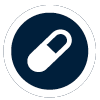How can I manage my symptoms and side effects?
You may experience symptoms from your cancer or side effects from your cancer treatments.
Be sure to tell your cancer treatment team about any symptoms you are experiencing so they can determine if supportive or palliative care is appropriate. In most cases, these symptoms can be controlled with medications, exercises, or other therapies to help you feel better and continue with your daily life.
Side effects of treatment will vary. Immunotherapy side effects are treated differently than those of chemotherapy. Depending on the side effects, your dose of immunotherapy could be changed, treatment could be stopped, or corticosteroid therapy might be used. Be sure to talk to your doctor about any concerns or side effects you experience.
Possible side effects by treatment type

Surgery
- pain
- cough
- difficulty breathing
- bronchopleural fistula – an abnormal opening between the pleural space and an airway tube of the lung
- collapsed lung
- heart problems
- fatigue
- blood clots

Chemotherapy
- fatigue/constant tiredness
- ongoing infections
- hair loss
- infections
- anemia
- bruising and bleeding
- sore mouth
- loss of appetite
- decreased white blood cell count, called neutropenia
- numbness/tingling/pain/weakness in hands and feet
- changes in liver function tests

Targeted therapy
- skin problems and changes (dry skin)
- high blood pressure
- bleeding or clotting issues
- slow wound healing
- heart damage
- autoimmune reactions
- swelling

Immunotherapy
- diarrhea
- fatigue
- cough
- nausea
- skin rash
- poor appetite
- constipation
- muscle and joint pain
| Possible symptom or side effect* | Recommendations |
|---|---|
| Pain | Take pain medications as prescribed. |
| Both long-acting and short-acting pain medications are available. To be most effective, long-acting pain medications need to be taken before you feel the pain and are used on an ongoing basis to prevent and control pain. Short-acting medications can be used for immediate relief. | |
| It is important to advocate for yourself and tell your doctor if you are having problems with pain. Unless you tell them, your doctor cannot know you are still having problems with pain. | |
| Shortness of breath | Use inhalers or other medications to open up airways or reduce swelling. |
| Use portable oxygen when directed by your doctor. | |
| Severe sore throat | Take pain medications or other medications before eating or as prescribed. |
| Eat soft, cool foods; avoid citrus and acidic foods, and carbonated or caffeinated drinks. | |
| Skin rash / redness / peeling / itching | Moisturize skin before, during, and after therapy as recommended. |
| Wear loose-fitting clothes. | |
| Stay out of the sun. Use sunscreen when you go outside. | |
| Use hydrocortisone or antibiotic creams and/or oral antibiotics as prescribed. | |
| Fatigue / tiredness | Be kind to yourself. Rest when you need to and don’t take on additional activities. |
| Eat a healthy diet to ensure proper nutrition. | |
| Have your red blood cell levels checked. If they are very low, you may need a transfusion. | |
| Keep a regular exercise routine. Even light walking can help. | |
| Nausea / vomiting | Take anti-nausea medications as prescribed. These are usually most effective when taken before, during, and after therapy. |
| Eat small meals throughout the day. | |
| Hair loss | Plan for hair loss by getting a haircut, wigs, hats, or scarves. Keep in mind that not all treatments cause hair loss. |
| Weaker immune system | Wash your hands often, wear a mask, and try to avoid being around people who are sick. |
| Numbness or tingling of hands/feet | Avoid snug socks and shoes. |
| Exercise if you are able, including walking and other light activities. | |
| Dress appropriately, especially for cold weather | |
| Diarrhea | Drink plenty of non-caffeinated fluids. |
| Take anti-diarrhea medications as prescribed. | |
| Constipation | Take stool softeners or laxatives as prescribed. |
| Weight loss | Work with a nutritionist/dietitian to create a meal plan. |
| Avoid heavy and high protein meals prior to treatment. | |
| Take medications as prescribed. | |
| Chronic cough | Your doctor may recommend treatment to address airway invasion from the cancer. |
| Take medications as prescribed. |
*If you are on an immunotherapy, your side effects may be treated differently than those of chemotherapy or
targeted therapy.